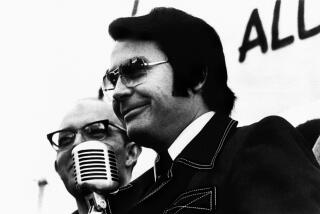TBN Seeking Wider Appeal for ‘Omega Code’
- Share via
A few weeks ago, producer Matthew Crouch rang up his financial angel, the man who helped him raise money to make his first film. Crouch had gotten comments from viewers at a preview screening and wanted to go over some changes.
It was a short call. “Listen, bud, I’m dealing with some other stuff here,” the benefactor said. “You just deal with it. I’ve got to go.” Click.
Another young producer might have been discouraged by such a brushoff. But one senses that Crouch easily forgave his father, the controversial televangelist Paul Crouch. The father-and-son team are behind “The Omega Code,” set to open Oct. 15, which marks a rare foray into theatrical films for Costa Mesa-based Trinity Broadcasting Network, the world’s largest Christian television network.
Paul Crouch, 65, founder and president of TBN, is credited as executive producer on the film. TBN put up part of the $8.5-million production budget and is kicking in free advertising worth at least $3 million. In return, the privately held network gets a large chunk of the theatrical rentals.
TBN is even broadcasting appeals to faithful viewers--who fork over an estimated $80 million in solicited donations to the network each year--to volunteer for promotional work.
It’s hardly a typical Hollywood arrangement, but then TBN--famous in religious and broadcasting circles for its unorthodox methods--has always marched to its own drummer. In making and releasing “The Omega Code,” the network has avoided the major studios or specialty distributors that would typically play a role in a picture this size.
Matthew Crouch, not surprisingly, is optimistic about the film’s chances in the market. For the last seven years, he’s run a post-production facility in a working-class neighborhood in Echo Park while trying to start a career as a movie producer. A slight man in his mid-30s with a reedy tenor, he appeared for an interview wearing a Nike sweatshirt and baggy black gym shorts and spoke excitedly of marketing and demographics. He looked and sounded more like a vacationing ad exec than the son of a charismatic televangelist.
Crouch hedges when asked if “The Omega Code” is a religious film, but clearly he’s aiming primarily for a core audience of evangelical Christians, who according to religion experts number roughly 75 million in the U.S. Stephan Blinn’s script is about an evil genius (played by Michael York, most recently of “Austin Powers” fame), who conspires to rule the world using the Bible code, a mathematical pattern that supposedly runs throughout the Scriptures and allows users to predict major events.
Although Crouch says he’s nurtured the idea of such a story for years, he’s deliberately cashing in on current events. A number of recent books have claimed to decipher the scriptural code. The best known is 1998’s best-selling “The Bible Code,” whose author, Michael Drosnin, claims to have predicted the assassination of Israeli Prime Minister Yitzhak Rabin and now forecasts a nuclear Armageddon in either 2000 or 2006.
“I thought [the code] was an interesting way to do a millennial countdown kind of element in our story,” says Matthew Crouch, comparing his film with Universal’s upcoming “End of Days,” starring Arnold Schwarzenegger, which finds Satan taking a millennial jaunt around New York.
Co-producer Gary M. Bettman, 43, says the goal was to make a crossover picture with appeal beyond the Bible Belt.
But will the film connect with audiences at the megaplex?
Movies with religious themes have a decidedly mixed record at the box office. In 1997, Robert Duvall’s “The Apostle”--a small-scale picture about a preacher’s spiritual redemption--began slowly but ended up a modest hit with a $20-million gross, largely on the strength of critical raves and several prominent awards and nominations. But 1991’s “The Rapture,” a film that posited dark questions about faith, evil and sexuality, received respectful notices and tanked anyway.
As a result, most marketers approach such pictures warily.
“It’s a genre that certainly hasn’t had enormous success in the past,” says Peter Graves, president of marketing for PolyGram Films, which is being dismantled after last year’s purchase by Seagram Co. “People with a heavy Christian orientation are not generally heavy consumers of [theatrical] films.”
While conceding the unpredictability of movie audiences, Graves says the Crouches’ best hope for substantial profit probably lies in video and TV revenue.
What’s more, many biblical scholars have cast skepticism, and sometimes ridicule, on the code, which they say trivializes the ancient texts for the sake of parlor tricks.
“It’s completely, utterly bogus . . . it’s using the Bible as Ouija board,” says Benjamin Hubbard, chairman of the comparative religion department at Cal State Fullerton. He adds, however, that the success of “The Bible Code” at bookstores proves the concept’s appeal to Christian fundamentalists and others who take the Bible literally.
Despite relatively limited resources, the producers are aiming for a big-budget look, Bettman says. Director Rob Marcarelli and crew endured a whirlwind 35-day shoot that included locations in Los Angeles, Israel and Italy. Considerable time in post-production has been spent adding special effects.
But the picture’s distribution will be unconventional, to say the least. “The Omega Code” will be released by Sherman Oaks-based Providence Entertainment, a 1-year-old company funded by Norm Miller, the chairman of Dallas-based Interstate Battery System of America, a leading supplier of replacement batteries for cars in the U.S.
Providence chief Victor L. Vanden Oever says the distributor plans to line up 300 screens with big exhibition chains such as AMC, Regal Cinemas and Cinemark. Although that’s a much smaller release pattern than the 2,000 or more screens reserved for most studio films, “The Omega Code” will get far wider play than many specialty films, which debut on a handful of screens in select markets. “The Omega Code” will play on 60 screens in the Los Angeles area alone, Vanden Oever says.
“You’ll see us everywhere,” he says. “Our intention in Los Angeles is to look like a major studio release.”
Yet the film’s success will ultimately depend on Trinity, whose only previous theatrical experience consists of a little-seen feature, “China Cry,” in 1991. The privately held network is a major player in religious broadcasting, with 12 full-power and more than 300 low-power stations nationwide. It is so successful in raising money from viewers--the phone number for its headquarters is broadcast around the clock--that the company last year spent millions to open a luxurious office and studio space in Costa Mesa.
The televangelist’s business practices have sometimes been questioned. Former employees have accused Crouch of avoiding paying workers’ Social Security taxes and charging personal expenses to his nonprofit ministry, both of which the company has denied. In an unusual move, the Federal Communications Commission last April pulled Trinity’s license for a Miami TV station after concluding that the network had created a fake minority-owned broadcasting company to evade government rules limiting station ownership. (TBN is appealing the FCC ruling; repeated attempts to reach Paul Crouch, who generally avoids mainstream media, were unsuccessful.) Matthew Crouch says his father came to the set a few times and offered suggestions at the preview screening, but otherwise kept his distance.
But if “The Omega Code” proves successful, Crouch says his father may be tempted to tackle a long-held cinematic dream--one that could go “Armageddon” one better.
“My dad would like to do a picture that has a $20- to $30-million special-effects budget,” he says. “It’s based on Revelations and is an apocalyptic kind of thing.”
More to Read
The biggest entertainment stories
Get our big stories about Hollywood, film, television, music, arts, culture and more right in your inbox as soon as they publish.
You may occasionally receive promotional content from the Los Angeles Times.











